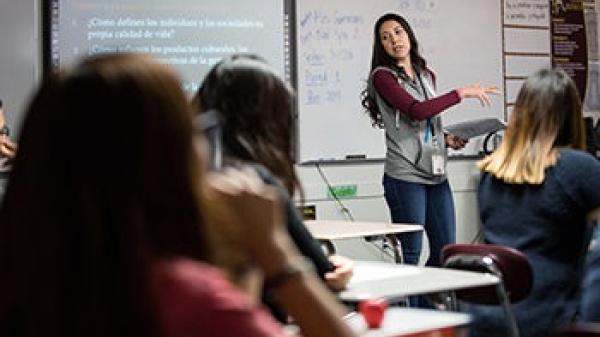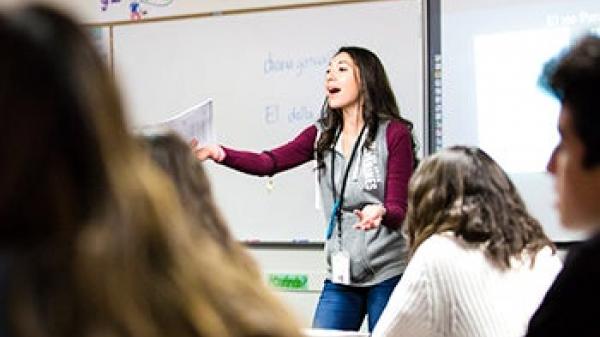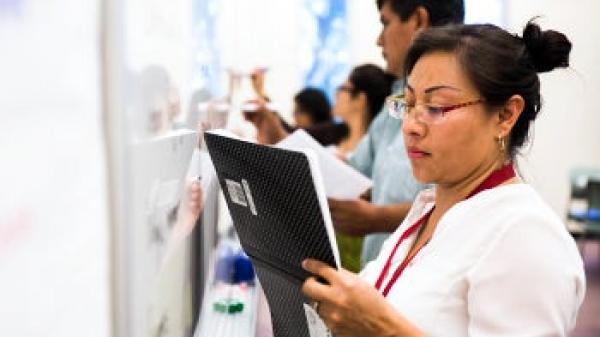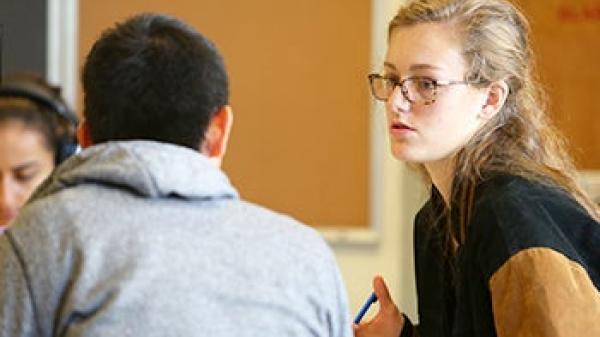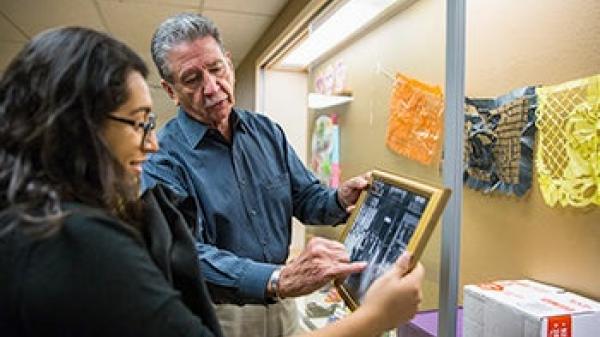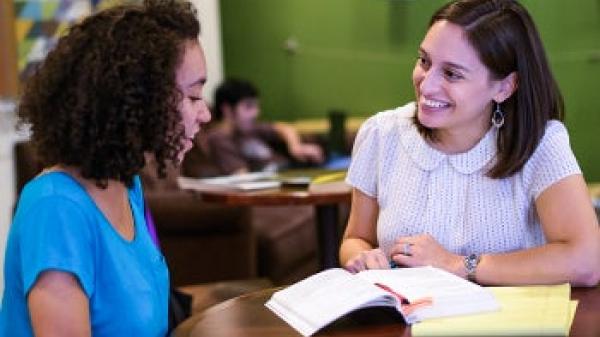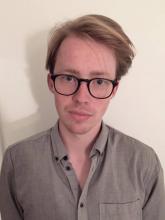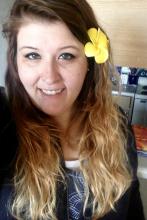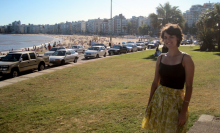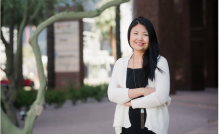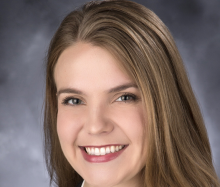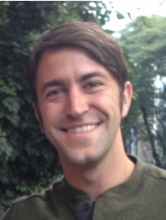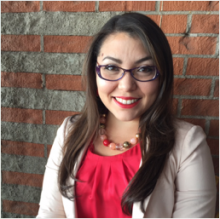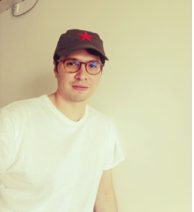Overview
When you learn Spanish, you unlock your ability to communicate effectively with more than 600 million people around the world, gaining a deeper appreciation for their cultures. Fluency in the Spanish language and Hispanic cultural practices, coupled with critical thinking and analytical skills, will give you an unparalleled competitive edge in today's job market as well as in our increasingly diverse and multicultural society. Traveling, living and working in Spanish-speaking communities around the world provides many personal and professional opportunities for embracing life in a globalized world.
Spanish Courses at ASU
Discover what Spanish courses at ASU have to offer you and how becoming proficient in Spanish language and culture can open doors for you, in your community and abroad.
Would you like to join us?
Dive in
As a student in the Spanish program at Arizona State University, you can learn not only the valuable language skills to be able to communicate effectively in the language but also fascinating cultural, literary, and linguistic topics that make Spanish and its people such a vibrant community. Being bilingual and bicultural gives you many advantages in today’s competitive job market and beyond.
Employers appreciate the skills studying Spanish provides our students: cultural competency, critical thinking, new perspectives, and problem-solving skills. Many students who have finished a degree in Spanish find careers in a variety of fields such as Academia, Advertising, Business, Healthcare, International Business, Journalism, Justice Studies, Social Work, Tourism, and more. Check out how language connects to your passion.
Spanish also makes a great concurrent degree and pairs well with health-related degrees, speech and hearing sciences, journalism, business, engineering, and many other fields.
To find out what course is most appropriate for you, please take the placement exam. If you have questions please chat with our wonderful advisors to see how to get started with your Spanish Degree! You can also contact the Spanish Language Program Director, Steven Flanagan with additional questions or concerns.
Follow the Spanish program on Instagram!
Spanish Program Mission
The Spanish Language Program in the School of International Letters & Cultures supports ASU’s Charter by measuring itself “not by whom it excludes, but by whom it includes and how they succeed.”
We recognize the human side of language learning as we engage all students in authentic language use while developing transferable skills for personal and interdisciplinary purposes in increasingly globalized societies.
Individuals enrolled in the program will develop communicative abilities in Spanish through collaboration, critical thinking, proficiency-focused language instruction, culturally-infused experiences, and applied learning opportunities across the communities we serve.
Students will also acquire skills for continued learning outside the classroom and explore the importance of the Spanish language and Hispanic cultures, becoming future advocates for a multilingual and multicultural society.
We develop and execute high quality, collaborative instruction based on standards and systematic program initiatives.
This multifaceted approach promotes a sense of belonging while creating meaningful language learning experiences for all.
The Spanish Heritage track
The Spanish Heritage track is specially designed for students who have primarily learned Spanish either at home or living within a Spanish-speaking community. This track has been created to help bilingual students expand their Spanish skills and knowledge of their cultural heritage in a rich, confidence-building environment.
How are these courses different than the regular Spanish?
Heritage learners’ needs are different from traditional second language learners, whom have not been in constant contact with Spanish while growing up. We offer these separate courses as recognition of heritage learners’ unique abilities and needs within our classrooms, and as a way to expand our Spanish-speaking community at Arizona State University.
How are these courses different than the regular Spanish as second language courses?
-
Classes focus on cultural heritage.
-
All levels of Spanish have a place in the program, from beginning to advanced.
-
Students share similar language and cultural experiences that are incorporated into the course materials.
Spanish Heritage learners will be able to:
Our mission is to promote Spanish language development and maintenance in the Southwestern United States. We believe that every heritage student has rich linguistic resources and a cultural appreciation that is welcome and nourished in the classroom context.
In our program, SHL learners will be able to:
- Expand their oral and written skills in the Spanish language
- Build community with other heritage learners at ASU, and expand their Spanish-speaking professional network.
- Learn more about Spanish-speaking cultural heritages in the United States and other countries
- Broaden their personal histories by learning about the cultural experiences of U.S. Latinos
- Develop a critical understanding of issues surrounding bilingualism in the U.S.
- Become prepared to enroll in upper-division courses leading to a major or minor in Spanish
To find out what course is most appropriate for you, please take the placement exam. If you have questions or concerns, please contact the SHL program director, Dr. Sara Beaudrie or Melissa Negron, SHL program coordinator
Signing up for Heritage classes: Courses in the program include Spanish 203, Spanish 203, Spanish 315 and Spanish 316.
Degrees
Spanish, BA
Explore the Hispanic world's fascinating cultures by learning the world's third most spoken language, with about 41 million Spanish speakers in the U.S. alone. Fluency in Spanish, coupled with critical thinking and analytical skills, offers an unparalleled competitive edge in today's job market and our increasingly diverse society.
Spanish, MA
Work closely with expert faculty as you explore intersections of literature and culture or linguistics across the Spanish-speaking world, and become a global citizen prepared for countless career options.
Spanish linguistics, PhD
Receive solid academic preparation, intensive professional development opportunities, and strong pedagogical training and teaching experiences in this doctoral program.
Spanish Literature and Culture, PhD
Develop an advanced knowledge of Peninsular, Latin American and Mexican American literature and cultural production. Mentoring by renowned faculty and coursework in a number of available tracks help you develop a sound knowledge of genre, periodization and scholarly research in the field.
Spanish, minor
If you want a competitive edge in today's job market and changing cultural landscape, you'll want the fluency in Spanish and the critical and analytical skills this program provides. It will broaden your perspectives and prepare you for future opportunities.
Latin American studies, certificate
A certificate in Latin American studies adds depth to any field of study. You'll learn to interact with diverse populations and appreciate the cultural differences. Cultural competency makes you more competitive in various industries, and this certificate is the first step.
Translation, certificate
Our globalized world has an increasing need for translators in both the private and government sectors. A certificate in translation can pave the way to a career in several fields.
Spanish in the news

Study abroad experience helps integrate students further in Spanish language, culture
Last summer, School of International Letters and Cultures Associate Teaching Professor Steven Flanagan and Assistant Teaching Professor Melissa Negron took students to Alicante, Spain, for an immersive learning experience to not only work on their language skills but also gain cultural awareness in a new setting.
“What we try to do in our programs is to develop students who have intercultural competence, who have the ability to interact with people in other cultures in other parts of the world, and studying abroad does that,” said Flanagan.

12 top jobs for Spanish majors
You might have grown up speaking Spanish or fallen in love with it in school. Either way, your language skills can unlock opportunities that span industries and borders, from community health care to international business.
In today’s global economy, combining cultural understanding and critical thinking with Spanish fluency gives you a competitive edge. A Spanish degree builds language skills while helping you connect across cultures and confidently navigate complex challenges.
“Spanish degrees emphasize critical thinking and writing skills,” said Cynthia Tompkins, professor of Spanish at Arizona State University’s School of International Letters and Cultures.

Global Doors: What Spanish and Portuguese can do for you!
Discover how your language skills open global doors! At this dynamic career fair hosted by the School of International Letters and Cultures, Spanish, Portuguese, and Brazilian Studies students will connect with professionals from diverse industries—education, international business, government, NGOs, translation, and more. Students will explore internships, job opportunities, and graduate programs where multilingual and cross-cultural communication skills are in high demand.
This event is designed to help you see how your language and cultural expertise can translate into real-world impact and meaningful careers, both in the U.S. and abroad.
Outreach Programs
Los Diablos The purpose of this organization shall be to build a strong, reliable community, to portray the Los Diablos mission through action and service, to keep previous Los Diablos scholars engaged, and to encourage members to grow as leaders and take initiative.
Spanish Honorary Society Sigma Delta Pi – ASU- Theta Epsilon Chapter includes Spanish graduate and undergraduate students. As an outreach program, Entre Amig@s is a Spanish conversation club facilitated by our graduate students that serve students of all levels of Spanish. This club creates a safe space for learners, heritage speakers, and native speakers to gather. We also welcome those who are not formally learning Spanish at ASU but are students who have an interest in the Spanish language and/or its accompanying cultures. Graduate students facilitate weekly in-person sessions for students to participate in various activities that prompt them to discuss all types of themes in Spanish.
Picnic at the Park
This is an event where all the students in the Heritage Language Program and TAs go to the park to celebrate our Spanish and create a community. This day we meet at the park and TAs provide delicious food. We also have fun activities and games.
  |
The undergraduate student conference (Congreso de Estudiantes Subgraduados de Español por Herencia)
At this conference, the students enrolled in SPA 315, and SPA 316 present the research paper they completed for class. The students are required to submit an abstract, and once they are reviewed, they get an acceptance email to Congress. This provides students a learning experience about presenting at professional conferences in Spanish. This is a free conference, and everyone is welcomed. Food is also provided at the conference. Most importantly, at this conference, we validate and highlight the importance of Spanish maintenance and developing more literacy skills in this language.
   |
Spanish Language and Mayan Culture in Merida, Mexico
The program in Mexico consists of five weeks in Mérida, Yucatán including substantial cultural travel in the Mayan region, in such world-renowned sites as Chichen Itza, Tulum, Xcaret, Celestún, Izamal, Uxmal, and the international resort town of Playa del Carmen in the Riviera Maya.
Spanish Language, Literature, & Culture in Spain
The four-week “Spanish Language & Mediterranean Culture” program is designed to give participants a comprehensive view of the rich and unique cultural history of southern Spain, with emphasis on its rich Arabic heritage. It combines features of a traditional study abroad program with visits to Granada, Córdoba, and a traveling seminar to Madrid.
Culture and Text in Contemporary León & Barcelona, Spain
Led by a native Spaniard, the "Culture and Text in Contemporary León & Barcelona, Spain" study abroad program gives students an insider perspective on Spanish society and a full sense of Spanish life and culture.
ASU has a partnership with the Peace Corps. Talk with a recruiter to learn more.
Volunteer to be a teaching assistant in Chile through Centro de Voluntarios.
Check out our study abroad trips in SILC.
The ability to speak another language opens up more opportunities for scholarships and fellowships. Take a look at our SILC scholarships. ASU also offers an extensive database for you to search through and find the right ones to apply for.
In the Study Abroad Office, Shira Burns oversees applications to programs. Study Abroad’s deadlines for applying for all programs are September 25th for the spring and February 15th for the fall. ASU financial aid is accepted for all programs on Study Abroad’s approved list.
Here is a list of a few scholarships specific for language:
- Fulbright
- Boren
- Benjamin A Gilman International Scholarship
- USAC Study Abroad Scholarship
- Stohl International Undergraduate Research Scholarships
Fellowships and Internships
- U.S. Department of State has a student internships program through Pathways.
- Thomas Perking Undergraduate and Graduate Foreign Affairs Fellowship
- European Union Internships in Europe.
- European Union Internship in the United States.
- Cultural Ambassador Program
People
Faculty
Alumni Stories
Name Matthew Powell
Graduation year 2015
Major Film and Media Production
Minor Spanish
What's your current job?
I am working as a video editor.
How does language and culture help you succeed in your career?
One of the aspects that I enjoy the most about working in a creative field is that you are required to have a broad cultural knowledge. The more steeped you are in culture, the deeper a well of resources you can draw from. And language is the best tool to access culture! Knowing Spanish and French—which I also studied during my last year as an undergrad at ASU—makes my world a much wider place.
Did you study abroad? If so, can you speak about your experience?
The semester that I spent studying in Prague, Czech Republic instilled in me a desire to live in unfamiliar cultures. I've always loved travel, but, after that experience, I don't know if I can be content with just being a tourist again. I found it much more gratifying to live close to the culture and get to know the rhythms of daily life there. Studying abroad was a fantastic opportunity to do just that. Through that experience, I was brought into contact with people and places that are now quite important to me.
How did ASU and the language program at SILC prepare you for your future?
The connections I made through ASU and SILC have already led me in unexpected and exciting directions. Since graduating, I’ve been contributing audiovisual essays to an online Cervantes course that my former Spanish professor, Dr. Gil-Osle, is developing. In these videos, I explore film adaptations of Don Quixote and examine how the work has been interpreted across mediums and across cultures. This project has allowed me to combine my skills as a video editor with cultural sensitivity and analytical eye that I developed while at ASU.
Also, I just moved to Montreal, which is a bilingual city. My chances of success here are so much higher because I picked up French at ASU and have been studying it on my own ever since. I aim to eventually live in a Spanish-speaking culture, too.
What was your favorite thing about learning a language?
Learning a language has let me experience the world with renewed freshness and intensity. Ordinary objects are restored to me in all their strangeness when I have to stop and think about what they are called. Conversations require my full attention, and just understanding a joke can be enough to make it funny. Even after becoming quite comfortable in another language, small and surprising pleasures like these are a frequent occurrence.
Any advice for current language studies students?
Don’t get hung up on trying to communicate perfectly in another language. Instead of imagining how you would communicate something in your native language, just work from what you know of the foreign language—whatever your skill level. Language is a game with no winners or losers!
What's your current job?
I'm currently employed as a Claims Representative with the Social Security Administration.
How does language and culture help you succeed in your career?
I speak Spanish every day in my current job. I also had a fabulous adventure in language and culture in the South Pacific (Samoa) when I served as a Primary School Literacy Volunteer with the US Peace Corps after graduation.
Did you study abroad? If so, can you speak about your experience?
I did study abroad as undergraduate several times. I traveled overseas for the first time when I spent a month in Merida, Mexico through a summer program and later spent a semester in Buenos Aires, Argentina. I loved the culture in Buenos Aires so much that I decided to complete my Honors Thesis on a sociopolitical group there, and even had the opportunity to return for the 2nd semester. Study abroad helped me find my passion, which led me to the Peace Corps and will hopefully help me transition to my dream job after I finish my MPA. (I'm enrolled at ASU now too, but have no intentions of keeping a domestic desk job when I'm through!) My dream job would be to work for USAID and continue to experience foreign cultures while making a positive impact and helping the neediest (and often most deserving) populations of the world.
How did ASU and the language program at SILC prepare you for your future?
Learning to speak Spanish took many years, and without SILC I would never have accomplished my goal. It helped me open a lot of doors to communication and crosscultural exchange. It helped me develop the skills I needed to learn my 3rd language after graduation (Samoan) and will help me in the future as I add others to my repertoire!
What was your favorite thing about learning a language?
Learning a language opens new avenues to interpersonal relationships that would otherwise not be possible. The world is abundant and rich with marvels, but without the means to communicate traveling and working abroad would be much more difficult. It's like a passport in and of itself, and it gives you access to a lot of wonderful new things!
Any advice for current language studies students?
Stick with it. Learning a language is frustrating because it takes a while before things "click." For a while it seems like you have no hope, then like you can understand but cannot speak, and finally, things just fall into place. So don't quit!
ASU alumna turns her passion for language into a career
By Amanda Stoneman — July 31, 2017
In pursuit of a career that embodied her appreciation for language, Arizona State University alumna Elizabeth Meadows became a speech-language pathologist at Kino Junior High School.
“I wanted to do something with language and also with Spanish,” said Meadows, who completed her undergraduate and graduate coursework at ASU. “I was attracted to linguistics because I was interested in how concepts are translated from one language to another and in the different ways language develops.”
In 2007, Meadows started her Bachelor of Arts program in English linguistics from the Department of English with a minor in Spanish from the School of International Letters and Cultures. As a merit scholar in Barrett, the Honors College and the College of Liberal Arts and Sciences, she was able to travel during her undergraduate experience, studying abroad in France and Argentina.
Meadows also completed a Fulbright program in Uruguay before attending graduate school at ASU. In 2016, she received a Master of Science in communication disorders from the College of Health Solutions, which prepared her for clinical practice in speech-language pathology.
“I was very lucky to be able to travel as a first-generation college student,” Meadows said. “Those experiences really opened me up to the world and broadened my perspective.”
This past year, Meadows was on the Kino Junior High School staff as a speech-language pathologist. She works with students who have developmental language disorders, which affect their ability to understand language and express themselves.
“Most people think of a speech therapist who helps kids with lisps or other speech disorders,” Meadows said. “That’s definitely a part of my job, but speech-language pathology is a really diverse field. I work with students who have expressive and receptive language disorders as well as some speech disorders. I also work with students on the autism spectrum with social language challenges.”
For example, some students have difficulty following and parsing complex sentence because the meaning of subordinate clauses isn’t clear. Students with these language disorders will have a block in understanding the context of academic content. They may also have trouble expressing their thoughts about what they do and don’t understand in a clear way to others.
“They might have a decent idea in their head about the content, but when they’re asked to explain it or write it down, they’re not able to express it,” Meadows said. “This can lead to a whole lot of frustration and behaviors that interfere with learning and other students’ learning.”
Next year, Meadows will continue as a speech-language pathologist but will also be working with the Mesa Public Schools district once a week as a bilingual evaluator. She’ll visit other sites and help other speech-language pathologists who have concerns about bilingual students who may be struggling with language differences rather than an actual language disorder.
“My Spanish minor really solidified my ability to be able to this type of work,” she said.
Meadows encourages students in college to take advantage of any opportunities for travel. She said it definitely helped her find her passion and discover what she wanted to do as a professional.
“I never really thought about travel as a child or teenager,” Meadows said. “But my experiences abroad really helped me and my appreciation for language and that’s what lead me to pursue speech-language pathology.”
ASU students can participate in any of the university’s more than 250 programs, in more than 65 different countries through the ASU Study Abroad Office.
ASU alumna advocates for others in her fulfilling career
By Rachel Bunning — January 4, 2018
It is rare to find a career based on one’s passion, yet Arizona State University alumna Sambo ‘Bo’ Dul has found exactly that in her job as an attorney at Perkins Coie LLP.
“I work on challenging, interesting issues that I care deeply about with colleagues that I admire and from whom I learn a great deal,” Dul said.
In 2005, Dul graduated with a Bachelor of Arts in political science from the School of Political and Global Studies, a Bachelor of Arts in Spanish from the School of International Letters and Cultures, and a Bachelor of Science in economics from the Department of Economics.
Her journey to graduation and success as an attorney wasn’t always easy. It started back when she was a baby and her family were refugees.
“When I was just a year old, my family fled Cambodia to the refugee camps along the Thai-Cambodian border,” Dul said. “There, we lived in makeshift shelters for four years before we were approved for resettlement in the United States.”
By the time her family arrived in Phoenix in 1988, they had endured more than 10 years of war and genocide. Yet through the trauma and sacrifices, including the loss of her father, Dul was inspired by her family’s immigrant experience.
“I had always wanted to be a doctor when I was younger, but my family had to deal with immigration-related issues when I was in high school. It made me realize how much law and policy can devastate normal people's lives,” Dul said. “This sparked my interest in law and politics and I quickly switched majors in my first year of college.”
Dul was an active student at ASU. She was part of Amnesty International, a grassroots organization that monitors and reports on human rights issues around the globe. She also started an organization to recruit and train students and community members to provide volunteer support services to recently resettled refugee families. During her studies, she spent a semester in Spain and another in Thailand through the ASU Study Abroad Office.
“I always say my time at ASU was some of the best years of my life,” Dul said. “It was when I first became socially and politically engaged and also when I really began to explore my family’s history and my place in and relationship to the world and the local community. I think my current career path flowed naturally from what I was learning and doing during college.”
After graduation, she worked in the refugee resettlement field with Community Outreach & Advocacy for Refugees in Phoenix. She later did a joint-degree program at New York University School of Law and Princeton University and received a JD and master’s degree in public affairs.
“Immediately after graduating from law and grad school, I worked at Sullivan & Cromwell LLP, a law firm in New York City, for about two years before starting a one-year clerkship with Chief Judge Theodore McKee on the U.S. Court of Appeals for the Third Circuit,” Dul said. “After the clerkship, I moved back home to Arizona and joined Perkins Coie LLP, in the litigation department.”
Dul now focuses on voting rights and election-related litigation, anti-corruption compliance and investigations and general business litigation. In conjunction with her duties, she maintains an active pro bono practice and regularly advises on immigrant and refugee rights.
“I feel incredibly fortunate to have found the professional home I have at Perkins Coie,” Dul said. “I’ve benefited greatly from the support and encouragement of so many people, organizations and institutions throughout my life. I want to be able to pay it forward and to live a life of purpose, gratitude and joy.”
Dul's persistence and dedication to her studies allowed her to make amazing strides. In the fashion of giving back and paying it forward, Dul has some valuable insight for current students at the university.
“Fill your days with work you care about and that interests you, surround yourself with people who inspire and encourage you, and try to find joy in small things. But most importantly, be kind, both to yourself and others.”
ASU students can participate in any of ASU’s more than 250 programs in more than 65 different countries through the ASU Study Abroad Office.
ASU alumna builds law career from liberal arts and sciences education
By Sarah Edwards — July 6, 2016
Samantha Winter grew up with Arizona State University in her backyard. As a Tempe native, she spent her childhood around campus, watching shows at ASU Gammage and participating in Sun Devil traditions. Now an alumna of the university, she's in the Valley growing her career in law.
“It was hard to turn down the opportunity to go to a major research university in a major city,” she said. “ASU offered me the best of all worlds, and it was something I was very familiar with.”
As a Flinn Scholar from a small high school in the Valley, Winter decided to attend college in her hometown, but she knew the university’s large size could be an adjustment. She quickly found comfort in the College of Liberal Arts and Sciences and Barrett, The Honors College.
“It was just sort of a culture shock in terms of how large it was,” Winter said. “Both the College of Liberal Arts and Sciences and The Honors College really helped me ground myself.”
Winter chose to pursue undergraduate majors in English, Spanish and history with the hopes of attending law school in the future. As an avid reader, English was an obvious choice for her. She chose Spanish because of its usefulness, and she added a dual emphasis in American and Latin American history to provide context for her other studies.
“What really attracted me to the College of Liberal Arts and Sciences is this idea that they are teaching you to think critically, and I knew that would be important generally in life, but also in what I thought would be my chosen career,” she said.
With different fields of study came interactions with a range of professors, which Winter enjoyed. Two of her close mentors later became her thesis advisers, and many wrote letters of recommendation for her as she pursued law school after graduation. Winter’s most influential mentors were Ted Humphrey, founding dean of Barrett; Janet Burke, former associate dean of Barrett; and Ileana Orlich, professor in the School of International Letters and Cultures.
“It was really nice to be able to have really talented faculty to go to and say, ‘I really liked this class — what should I do to follow up on this?’” she said. “I found the faculty to be very open and invested in their own research. It was very helpful having people who were passionate about what they were doing and share that passion.”
After graduating from the university in 2008, Winter attended law school at the University of Notre Dame. At the time, the job market for lawyers was daunting, but she decided to be flexible with her location and hoped for a chance to return to the Valley. Today, Winter is an attorney with Sacks Tierney, a law firm in Scottsdale, Arizona, where she does estate planning and probate litigation.
“I’m particularly pleased with what I’m doing now because I get to help people sort out problems before they occur … and I also get to get involved and advocate for people with something terrible that has happened to them,” Winter said. “It’s very rewarding and intellectually challenging.”
Winter attributes much of her success in law school to her liberal arts degrees, which she says taught her to think critically, argue effectively and become a strong writer.
“Getting to spend four years broadening my perspective, learning about the world, learning about what my place might be in it … was really valuable,” Winter said. “The liberal arts program, in general, provided a really strong foundation for me to build my profession.”
Winter recently went back to school to receive her Master of Laws in taxation in 2014, which was a major career change for her. She quickly discovered her liberal arts background would give her the confidence to tackle an intimidating new subject.
“As you’ve noticed in my degrees, there’s not a lot of math involved in any of those,” she said. “If you told me five years ago that I would be doing tax law, I would have laughed at you because it was my hardest course in law school, and I hated it because it was scary.”
As for the future, Winter plans to continue on her current career path, although the practice of law does have many options. She hopes to continue making a name for herself at Sacks Tierney. In her personal and professional life, Winter looks forward to having a family with her fiancé and having the chance to impact the people in her life.
“I would like the people I’m closest to be able to feel like I was an active member of their life who helped them achieve their goals,” she said. “You should try to make yourself the person who you needed when you were younger. And I would love to be able to do that professionally.”
Name Patrick Thomas Ridge
Graduation year May 2017
Major Ph.D. Spanish, Specialization in Latin American Literature and Culture
What's your current job?
Graduate Teaching Associate, Arizona State University (current)
Assistant Professor of Spanish, Virginia Polytechnic Institute and State University (Virginia Tech), begins Fall 2017
How does language and culture help you succeed in your career?
A knowledge of Spanish and Portuguese has provided access to a vast number of literary and cultural texts from Spain and Latin America. Since I have studied numerous forms of cultural production--novel, short story, film, photography, comics, etc.--I have discovered texts that have enriched my own research on Latin American soccer, while also providing engaging teaching materials for my students and their various learning preferences.
Did you study abroad? If so, can you speak about your experience?
I have had numerous study abroad experiences. During my undergraduate studies, I studied in Panamá City, Panamá (May 2006) and Segovia, Spain (Spring semester 2007). I then worked as an English Language and Culture Assistant in Córdoba, Spain during the 2008-09 school year. During my graduate studies at the University of Louisville, I studied in São José do Rio Preto, Brazil (June 2010). Finally, during my time as a Spanish Graduate Associate and Spanish Research Associate at Arizona State, I taught in Mérida, México for ASU's study abroad program in Yucatán and helped Dr. Foster coordinate the 2014 NEH seminar on Jewish Buenos Aires in Buenos Aires, Argentina.
I feel very lucky to have all of these experiences. While I have valued my time studying literature and culture on campus and in the classroom, experimenting with the Spanish and Portuguese languages while interacting with people from various regions has allowed me to hone my language skills and reflect on my own culture and background.
How did ASU and the language program at SILC prepare you for your future?
During my first semester at Arizona State, Dr. Foster, my dissertation chair, encouraged me to pursue my research interests in Latin American sports. Without this initial push and his sincere dedication to my graduate studies, I would not be where I am today. This support, along with the knowledge acquired during my SILC coursework, has not only enhanced my knowledge in Latin American literature and culture but also prepared me for future community and academic endeavors.
Recognizing the program's dedication to innovative research on cultural studies, my dissertation explores literary representations of Latin American soccer. I have found that the game represents more than just a mere sport, but rather a significant social and cultural entity that facilitates an understanding of the region. Aside from my dissertation, my coursework on visual studies in the Department of Spanish and Portuguese, and the support of my dissertation committee--Dr. Foster, Dr. Tompkins and Dr. Urioste have resulted in various publications for some of the nation's most recognized scholarly journals. For instance, I have published on an Argentine documentary, masculinity in Brazilian film, and representations of violence in contemporary Spanish cinema in Studies in Latin America Popular Culture, Romance Notes, and Hispanic Journal.
What was your favorite thing about learning a language?
My favorite thing about learning a language is that it helps us strengthen a human connection with others. I have realized this most while volunteering as a medical interpreter for Cathedral Health Services in downtown Phoenix. I understand that my language skills both facilitate medical care and ensure patient comfort.
During my time abroad and at Arizona State, I have also established many wonderful friendships, and I know that without my knowledge in Spanish and Portuguese, this would not have been possible.
Any advice for current language studies students?
ASU offers numerous cultural opportunities and activities, and I recommend that every student take advantage of these. Furthermore, take advantage of all resources on campus and at ASU's libraries--digital access to Latin American newspapers, myspace, etc. Also, take courses outside your field. For instance, I took a course on Digital Humanities with Dr. Wernimont during my last year at ASU. Even though I am not a DH specialist, I use skills learned in the course to prepare my courses, develop collaborative group projects for my students, and approach my research in alternative ways.
Name Laura E. Belmonte
Graduation year December 2016
Major Ph.D. in Spanish, concentrated in Chicano Literature and Cultural Studies
What's your current job?
I will be starting my position as Assistant Professor of Chicana and Chicano Studies at the University of New Mexico this Spring 2017.
How does language and culture help you succeed in your career?
Being bilingual and bicultural has always been to my benefit, especially professionally. My parents are Mexican immigrants, and for most of my life, I have been able to communicate in English and Spanish, thus allowing me more opportunities in whatever field I decided to go into. Also, growing up in a home in which Mexican culture was embraced showed me cultural competence in understanding other person's perspectives, be it in the workforce or in society in general. Now as a professor, I encounter students, faculty, and community members from all backgrounds, language preferences, and perspectives on how to approach difficult issues in our society, and being able to communicate and empathize both culturally and linguistically has been a huge factor in my professional and academic success.
How did ASU and the language program at SILC prepare you for your future?
Being at a university like ASU has opened the path for me to work with faculty that are well-known in their respective fields, and allowed me to achieve higher standards of academic writing and research. The faculty I worked with at SILC are excellent educators and scholars who have molded me to be inquisitive, seek the latest theoretical applications, and be brave in delving into the difficult questions of my field. I will be forever grateful to my time and education at ASU and SILC, as it has been a formative experience in my scholarly work that I will carry with me for the rest of my career.
What was your favorite thing about learning a language?
Learning a new language made me a more empathetic person to those around me, especially those who immigrate to this country. I learned Portuguese and Italian in graduate school, and those experiences opened my eyes, especially as a person who has been bilingual in English and Spanish most of her life, to how difficult acquiring a new language it can be. However, I am so grateful I did learn new languages because not only can I have access to the world around me in four languages, but I have learned patience, perseverance, and the complete satisfaction of communicating with so many of those around me.
Any advice for current language studies students?
Language learning is a gift. Because of this, persevere in learning as many languages as you can, because the world opens up in a way that you can't imagine. Read news articles from another country, try to avoid hitting the "translate" button on social media with your multilingual friends. It will expose you to so many wonderful things this world has to offer.
What's your current job?
I am currently a Spanish instructor at Washington State University where I also teach classes about intercultural communication in English.
How does language and culture help you succeed in your career?
It helped me a great deal. In a global economy, a second or third language is a skill that opens opportunities for a variety of jobs, from teaching to technology. More than ever, companies are looking for bilingual or trilingual candidates that are able to work across not only geographical but cultural boundaries in order to sell/promote their products be they video games or toasters. Before finding a job in academia, I was hired by Microsoft as a translator for the new X-Box console, a job offer one would not expect to get having majored in languages and cultures.
Did you study abroad? If so, can you speak about your experience?
Actually being at ASU was my experience studying abroad. I’m from Mexico, I got my bachelor’s degree there and I applied for grad school in the US. It was one of the best decisions I’ve made in my life. I learned many things. The best thing was to have access to resources I’ve never dreamed of, including the professors and the wonderful library at Tempe. I got a better understanding of American culture and improved my English, not to mention that I learned two other languages, Portuguese and French.
How did ASU and the language program at SILC prepare you for your future?
At first, I didn’t feel I was being prepared for something big. But once you graduate, start searching for jobs and finally find one, that is when you really come to appreciate all you’ve learned at ASU. After my graduation, I worked in China and then WSU and I implemented projects and ideas I learned from my professors at ASU that were innovative. When your boss/supervisor congratulates you for that it’s when you really appreciate all you’ve learned in ASU.
What was your favorite thing about learning a language?
I love languages. I’m able to communicate in four languages and I feel I’ll never stop learning. Every day I am constantly learning not only words or phrases but also about culture, people and experiences. My favorite thing about it is the great chance I have to get to know people from different countries and life experiences; there’s so much to learn from ordinary people and I’m thankful for this opportunity.
Any advice for current language studies students?
I would say that regardless of what you major in, learn a second language, any language. It will be a plus not only in financial or job terms but as a personal experience. To learn a language is to break stereotypes, to have a better understanding of the world and the people we share it with. It will help you to understand other people and, most importantly, your place in the world.

